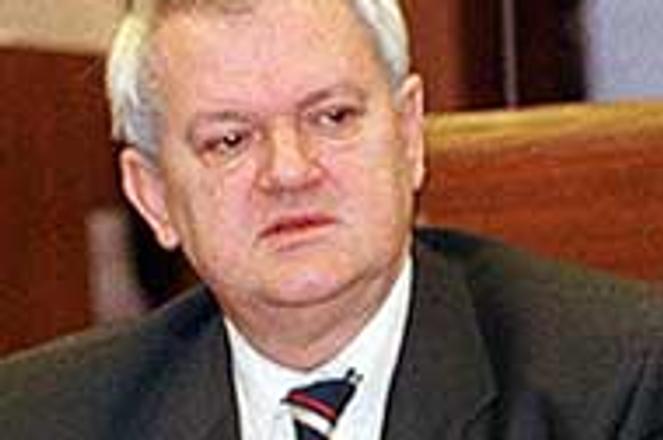Another irony. SDK caucus leader Roman Kováč is also an SDKÚ signatory.photo: TASR
The largest government party, the Slovak Democratic Coalition (SDK), remains bitterly divided over the future of a breakaway faction of SDK members led by Prime Minister Mikuláš Dzurinda. At issue remains the number of cabinet seats controlled by the Dzurinda faction, which other SDK members say should be more evenly divided between the party's five member groups.
The SDK's inability to solve the squabble has angered other ruling coalition parties, who say that the feud is slowing the pace of economic reform and creating confusion over which faction each government minister appointed by the SDK represents.
"Clear relations are the basis of [government] stability," said Pavol Hamžík, chairman of the minor coalition partner Civic Understanding Party. Hamžík, who along with the Democratic Left Party has been particularly fed up with turmoil in the SDK, last week helped a bill to pass first reading in parliament that would forbid membership in more than one party - a direct challenge to the SDK's complicated membership system, which has been blamed for most of the party's current problems.
"We wanted to send a clear message [with the vote in parliament]," Hamžík added. The bill is now being discussed by parliamentary committees before going to a final reading this September.
The SDK was formed as a party in 1998 in order to circumvent the terms of a harsh election law introduced by the former Vladimír Mečiar government. The five parties which had originally comprised the SDK coalition united to form a single party, but MPs were allowed to retain membership in their former parties.
The arrangement proved an unwieldy one, as the five SDK 'platforms' (member parties) competed for influence in the SDK and were often unwilling to obey the party's leadership. In response, Dzurinda this spring launched a new party - the SDKÚ - which was meant to replace the SDK and its combative factions. SDK members were given two choices - to join Dzurinda, or face a bleak political future with the SDK's abandoned platforms.
However, the Dzurinda initiative backfired when other government parties objected that since they had signed a coalition power-sharing agreement following 1998 elections with the SDK, they had no assurance that the SDKÚ would abide by the terms of that deal. Both the Democratic Left and Civic Understanding have recently called for the coalition agreement - which took two months of haggling to finalise - to be re-opened and rewritten.
The prime minister also faced a backlash from angry SDK members, who are pressuring him to turn the SDKÚ into a sixth SDK platform and then redistribute the SDKÚ's seven cabinet seats more equitably among the other five parties, who now collectively hold three posts.
Under pressure to resolve the situation, the SDK held an internal ballot on June 23 to turn the SDKÚ into a sixth platform. The vote split the party, with 19 of 42 SDK members voting in favour, four against, five abstaining and nine not voting at all.
A disappointed Dzurinda said after the vote that the ballot had not improved the SDK's internal relations. "It was more divisive than unifying. It didn't help anyone," he commented.
The prime minister thus faces a dilemma - he can't abandon his SDKÚ project, for that would lead to a cabinet shuffle and cost him support in the government, but neither can he afford to press ahead, because pressure to open the coalition agreement could bring down the government.
"It's a real dilemma, that's sure, but I think it's one the ruling coalition will survive," said Soňa Szomolanyi, the head of political science at Bratislava's Comenius University. "Just go back to the fight between [former Prime Minister Vladimír] Mečiar and [former President Michal] Kováč - Mečiar thought he was the stronger, but Kováč won in the end, even though it took years."
Szomolanyi added that the SDK situation was now likely to remain at a standoff until a more immediate crisis - the health of President Rudolf Schuster - was past. "The president's fate is a new variable which makes the whole situation much more uncertain," she said. "If he doesn't survive then the whole coalition will have a much more crucial problem to deal with."



